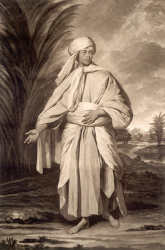

He instantly became the darling of the London beau monde. He was presented to King George, he was entertained at the grand houses of the capital, he became the guest from whom an accepted invitation would make any soiree a success. He was, Nicholas Thomas writes, "taught to play cards, kiss a lady's handkerchief, and take a fancy, supposedly, to trivial and useless curiosities." The novelist Fanny Burney came to know him and like him. He was courtly and polite, flirtatious and (so one gathers) remarkably well endowed sexually and, possibly as a result of this, in constant social demand. He was paraded, and he was painted � most notably by Sir Joshua Reynolds, who presented him larger than life in the style of a Greek god, and in doing so broke with the tradition of hitherto offering natives on canvas only in humiliating roles, and never as figures of evident nobility.
It is in Reynolds's painting � which is not illustrated in Cook, though a lesser offering by Nathaniel Dance is � that we see the dilemma that was to haunt intellectual England at the very time of James Cook's great ventures. Omai came fast to be recognized as a shining example of the newly coined figure, the Noble Savage. In his innocent, uncomplicated, prelapsarian goodness � and with his origins in a land widely seen as a distant paradise � this young man seemed to Londoners to embody all that they were themselves on the verge of abandoning, in their rush to industrialize and modernize and turn everything to profit.
Was Commerce, they suddenly began to wonder, truly the way to go? Or did Omai perhaps suggest a kind of human perfection to which all should in fact aspire? For a brief moment, in 1775 or so, England's ambitions paused at such wondering, and people considered � with Omai the fortuitously present catalyst for consideration � the rightness of their chosen ambition.
But then, of course, they pulled themselves together. They ceased their maunderings, they got right back up, dusted themselves off and climbed back on the great beast Progress and got on, helter-skelter, with the lives that they still lead today. It would be left to Rousseau and Melville and Gauguin to remind us of the nobility of the primitive, and for others to condescendingly exoticize its charms. In 1777, James Cook took Omai back home to Tahiti (where he died a lonely outcast, his soul polluted by the two years in Western society), after which, and by melancholy coincidence, he sailed on to his own savage death in Hawaii two years later.
~The Extraordinary Voyage of Captain James Cook by Nicholas Thomas
Back to Capt. James Cook page